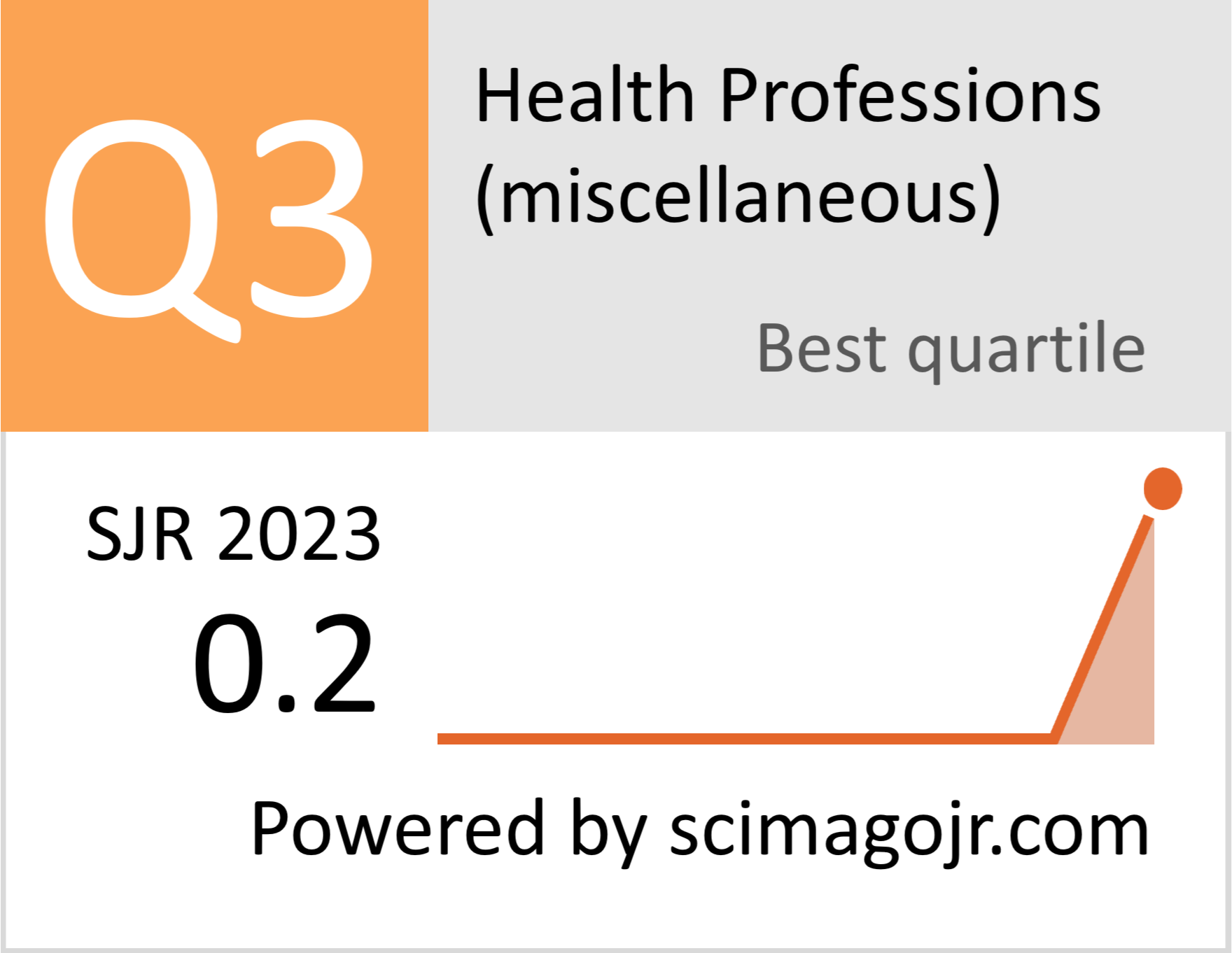Are Mindfulness and Sleep Predictors of Cognitive Fatigue in Student Athletes?
¿Son la atención plena y el sueño predictores de la fatiga cognitiva en los estudiantes deportistas?

This work is licensed under a Creative Commons Attribution-NonCommercial-NoDerivatives 4.0 International License.
Show authors biography
Introduction. Cognitive fatigue is crucial for student-athletes who have the task of both fulfilling their academic tasks and ensuring their athletic performance. Therefore, it is essential to explore the predictors of cognitive fatigue in student-athletes.
Objective. This study aimed to examine mindfulness and sleep behavior as predictors of cognitive fatigue in student athletes.
Method. A total of 144 student-athletes (40.3% male, 59.7% female, M age = 20.7, SD = 3.13) with a mean sports experience of 9.03 years (SD = 3.75) were included in the study. The Mindfulness for Sport Inventory (MIS), the Athlete Sleep Behavior Questionnaire (ASBQ), and the cognitive fatigue part of the Scale of Physical and Cognitive Fatigue Perceived (SPCFP) were used as data collection tools.
Results. Cognitive fatigue was negatively associated with mindfulness while positively associated with poor sleep behavior. In addition, mindfulness and sleep were significant predictors of cognitive fatigue.
Conclusion. Mindfulness and sleep should be taken into consideration to reduce cognitive fatigue in student-athletes.
Article visits 644 | PDF visits 106
- Hockey R. The psychology of fatigue: Work, effort and control. New York: Cambridge University Press; 2013. 290 p.
- Marcora SM, Staiano W, Manning V. Mental fatigue impairs physical performance in humans. J Appl Physiol (1985) [Internet]. 2009;106(3):857-64. doi: https://doi.org/10.1152/japplphysiol.91324.2008
- Boksem MA, Meijman TF, Lorist MM. Effects of mental fatigue on attention: an ERP study. Brain Res Cogn Brain Res [Internet]. 2005;25(1):107-16. doi: https://doi.org/10.1016/j.cogbrainres.2005.04.011
- Yuan R, Sun H, Soh KG, Mohammadi A, Toumi Z, Zhang Z. The effects of mental fatigue on sport-specific motor performance among team sport athletes: A systematic scoping review. Front Psychol [Internet]. 2023;14:1143618. doi: https://doi.org/10.3389/fpsyg.2023.1143618
- Slimani M, Znazen H, Bragazzi NL, Zguira MS, Tod D. The effect of mental fatigue on cognitive and aerobic performance in adolescent active endurance athletes: insights from a randomized counterbalanced, cross-over trial. J Clin Med [Internet]. 2018;7(12):1-10. doi: https://doi.org/10.3390/jcm7120510
- Van der Linden D, Frese M, Meijman TF. Mental fatigue and the control of cognitive processes: effects on perseveration and planning. Acta Psychol (Amst) [Internet]. 2003;113(1):45-65. doi: https://doi.org/10.1016/S0001-6918(02)00150-6
- Boksem MA, Tops M. Mental fatigue: costs and benefits. Brain Res Rev [Internet]. 2008;59(1):125-39. doi: https://doi.org/10.1016/j.brainresrev.2008.07.001
- Smith A. Cognitive fatigue and the wellbeing and academic attainment of university students. Journal of Education, Society and Behavioural Science [Internet]. 2018;24(2):1-12. doi: https://doi.org/10.9734/JESBS/2018/39529
- Sun H, Soh KG, Roslan S, Wazir MRWN, Soh KL. Does mental fatigue affect skilled performance in athletes? A systematic review. PloS one [Internet]. 2021;16(10):e0258307. doi: https://doi.org/10.1371/journal.pone.0258307
- Gantois P, Caputo Ferreira ME, Lima-Junior Dd, Nakamura FY, Batista GR, Fonseca FS, et al. Effects of mental fatigue on passing decision-making performance in professional soccer athletes. Eur J Sport Sci [Internet]. 2020;20(4):534-43. doi: https://doi.org/10.1080/17461391.2019.1656781
- Turkelson L, Mano Q. The current state of mind: A systematic review of the relationship between mindfulness and mind-wandering. Journal of Cognitive Enhancement [Internet]. 2022;6(2):272-94. doi: https://doi.org/10.1007/s41465-021-00231-6
- Epel E, Daubenmier J, Moskowitz JT, Folkman S, Blackburn E. Can meditation slow rate of cellular aging? Cognitive stress, mindfulness, and telomeres. Ann N Y Acad Sci [Internet]. 2009;1172(1):34-53. doi: https://doi.org/10.1111/j.1749-6632.2009.04414.x
- Klein KP, Lancaster SL. Reexamining the association between facets of mindfulness and cognitive performance. Journal of Cognitive Enhancement [Internet]. 2017;1:345-51. doi: https://doi.org/10.1007/s41465-017-0037-0
- Jones BJ, Kaur S, Miller M, Spencer R. Mindfulness-based stress reduction benefits psychological well-being, sleep quality, and athletic performance in female collegiate rowers. Front Psychol [Internet]. 2020;11:572980. doi: https://doi.org/10.3389/fpsyg.2020.572980
- Moore A, Malinowski P. Meditation, mindfulness and cognitive flexibility. Conscious Cogn [Internet]. 2009;18(1):176-86. doi: https://doi.org/10.1016/j.concog.2008.12.008
- Jha AP, Stanley EA, Kiyonaga A, Wong L, Gelfand L. Examining the protective effects of mindfulness training on working memory capacity and affective experience. Emotion [Internet]. 2010;10(1):54-64. doi: https://doi.org/10.1037/a0018438
- Mardon N, Richards H, Martindale A. The effect of mindfulness training on attention and performance in national-level swimmers: An exploratory investigation. The Sport Psychologist [Internet]. 2016;30(2):131-40. doi: https://doi.org/10.1123/tsp.2014-0085
- Ancoli‐Israel S, Moore P, Jones V. The relationship between fatigue and sleep in cancer patients: a review. Eur J Cancer Care [Internet]. 2001;10(4):245-55. doi: https://doi.org/10.1046/j.1365-2354.2001.00263.x
- Yaffe K, Falvey CM, Hoang T. Connections between sleep and cognition in older adults. Lancet Neurol [Internet]. 2014;13(10):1017-28. doi: https://doi.org/10.1016/S1474-4422(14)70172-3
- Vitale KC, Owens R, Hopkins SR, Malhotra A. Sleep hygiene for optimizing recovery in athletes: review and recommendations. Int J Sports Med [Internet]. 2019;40(08):535-43. doi: https://doi.org/10.1055/a-0905-3103
- Faul F, Erdfelder E, Buchner A, Lang A-G. Statistical power analyses using G* Power 3.1: Tests for correlation and regression analyses. Behavior research methods [Internet]. 2009;41(4):1149-60. doi: https://doi.org/10.3758/BRM.41.4.1149
- Howell AJ, Digdon NL, Buro K, Sheptycki AR. Relations among mindfulness, well-being, and sleep. Personality and Individual Differences [Internet]. 2008;45(8):773-7. doi: https://doi.org/10.1016/j.paid.2008.08.005
- Byun E, Gay CL, Lee KA. Sleep, fatigue, and problems with cognitive function in adults living with HIV. J Assoc Nurses AIDS Care [Internet]. 2016;27(1):5-16. doi: https://doi.org/10.1016/j.jana.2015.10.002
- Zhang C, Shu P, Luo M, Liu X, Guo S, Pang B. The correlation between mindfulness traits and fatigue among Chinese civil aviation pilots. Industrial Engineering and Innovation Management [Internet]. 2022;5(10):31-5. doi: https://doi.org/10.23977/ieim.2022.051003
- Cohen J. Statistical power analysis for the behavioral sciences. New York: Routledge; 1988. 198 p.
- Patel HI, Rowe E. Sample size for comparing linear growth curves. Journal of Biopharmaceutical Statistics [Internet]. 1999;9(2):339-350. doi: https://doi.org/10.1081/BIP-100101180
- Thienot E, Jackson B, Dimmock J, Grove JR, Bernier M, Fournier JF. Development and preliminary validation of the mindfulness inventory for sport. Psychology of Sport and Exercise [Internet]. 2014;15(1):72-80. doi: https://doi.org/10.1016/j.psychsport.2013.10.003
- Tingaz EO. Adaptation Of The Mindfulness Inventory For Sport Into Turkish: A Validity And Reliability Study. Spormetre [Internet]. 2020;18(1):71-80. doi: https://doi.org/10.33689/spormetre.642682
- Tekkurşun Demir G, Cicioglu Hİ, Yarayan YE. Developing the Scale of Physical and Cognitive Fatigue Perceived (SPCFP): Validity and Reliability Study. Mediterranean Journal of Sport Science [Internet]. 2023;6(3):715-26. doi: https://doi.org/10.38021/asbid.1220568
- Driller MW, Mah CD, Halson SL. Development of the athlete sleep behavior questionnaire: a tool for identifying maladaptive sleep practices in elite athletes. Sleep Sci [Internet]. 2018;11(1):37-44. doi: https://doi.org/10.5935/1984-0063.20180009
- Darendeli A, Diker G, Çinar Z. Athlete Sleep Behavior Questionnaire-turkish version: study of validity and reliability. Journal of Turkish Sleep Medicine-Turk Uyku Tibbi Dergisi [Internet]. 2019;6(2):43-8. doi: https://doi.org/10.4274/jtsm.galenos.2019.58076
- George D, Mallery P. SPSS for windows step by step: A simple study guide and reference, 17.0 update, 10th ed. Chennai: Pearson Education India; 2011. 386 p.
- Cao S, Geok SK, Roslan S, Qian S, Sun H, Lam SK, et al. Mindfulness-based interventions for the recovery of mental fatigue: A systematic review. Int J Environ Res [Internet]. 2022;19(13):1-15. doi: https://doi.org/10.3390/ijerph19137825
- Kudesia RS, Pandey A, Reina CS. Doing more with less: Interactive effects of cognitive resources and mindfulness training in coping with mental fatigue from multitasking. Journal of Management [Internet]. 2022;48(2):410-39. doi: https://doi.org/10.1177/0149206320964570
- Zhu Y, Sun F, Li C, Huang J, Hu M, Wang K, et al. Acute effects of mindfulness-based intervention on athlete cognitive function: An fNIRS investigation. J Exerc Sci Fit [Internet]. 2022;20(2):90-9. doi: https://doi.org/10.1016/j.jesf.2022.01.003
- Zadkhosh SM, Zandi HG, Ghorbannejad M. The effects of Mindfulness-Based Cognitive Therapy (MBCT) on cognitive skills in young soccer players. Exerc Qual Life [Internet]. 2019;11(1):5-11. doi: https://doi.org/10.31382/eqol.190601
- Derakshan N, Eysenck MW. Anxiety, processing efficiency, and cognitive performance: New developments from attentional control theory. European Psychologist [Internet]. 2009;14(2):168-76. doi: https://doi.org/10.1027/1016-9040.14.2.168
- Vago DR, Silbersweig DA. Self-awareness, self-regulation, and self-transcendence (S-ART): a framework for understanding the neurobiological mechanisms of mindfulness. Front Hum Neurosci [Internet]. 2012;6:296. doi: https://doi.org/10.3389/fnhum.2012.00296
- Fullagar HH, Vincent GE, McCullough M, Halson S, Fowler P. Sleep and sport performance. J Clin Neurophysiol [Internet]. 2023;40(5):408-16. doi: https://doi.org/10.1097/wnp.0000000000000638
- Pourhassan J, Sarginson J, Hitzl W, Richter K. Cognitive function in soccer athletes determined by sleep disruption and self-reported health, yet not by decision-reinvestment. Front Neurol [Internet]. 2023;13:872761. doi: https://doi.org/10.3389/fneur.2022.872761
- Åkerstedt T, Knutsson A, Westerholm P, Theorell T, Alfredsson L, Kecklund G. Mental fatigue, work and sleep. J Psychosom Res [Internet]. 2004;57(5):427-33. doi: https://doi.org/10.1016/j.jpsychores.2003.12.001
- Wensink M, Schaap G, Ten Klooster PM, Doggen CJ, van der Palen J, Vonkeman HE, Bode C. Physical and mental fatigue in post-COVID syndrome and their associations over time: A small-sample ESM-study to explore fatigue, quality of sleep and behaviours. J Psychosom Res [Internet]. 2023;164:111084. doi: https://doi.org/10.1016/j.jpsychores.2022.111084
- Miyata S, Noda A, Ozaki N, Hara Y, Minoshima M, Iwamoto K, et al. Insufficient sleep impairs driving performance and cognitive function. Neurosci Lett [Internet]. 2010;469(2):229-33. doi: https://doi.org/10.1016/j.neulet.2009.12.001
- Garcia S, Alosco ML, Spitznagel MB, Cohen R, Raz N, Sweet L, et al. Poor sleep quality and reduced cognitive function in persons with heart failure. Int J Cardiol [Internet]. 2012;156(2):248-9. doi: https://doi.org/10.1016/j.ijcard.2012.01.037
- Lu J, An Y, Qiu J. Relationship between sleep quality, mood state, and performance of elite air-rifle shooters. BMC Sports Sci Med Rehabil [Internet]. 2022;14(1):32. doi: https://doi.org/10.1186/s13102-022-00424-2
- Benkirane O, Delwiche B, Mairesse O, Peigneux P. Impact of sleep fragmentation on cognition and fatigue. Int J Environ Res [Internet]. 2022;19(23):1-20. doi: https://doi.org/10.3390/ijerph192315485
- Liu J, Zhou G, Wang Y, Ai Y, Pinto-Martin J, Liu X. Sleep problems, fatigue, and cognitive performance in Chinese kindergarten children. J Pediatr [Internet]. 2012;161(3):520-5.e2. doi: https://doi.org/10.1016/j.jpeds.2012.03.018
- Wilkes JR, Walter AE, Chang A-M, Miller SJ, Sebastianelli WJ, Seidenberg PH, et al. Effects of sleep disturbance on functional and physiological outcomes in collegiate athletes: A scoping review. Sleep Med [Internet]. 2021;81:8-19. doi: https://doi.org/10.1016/j.sleep.2021.01.046
- Fullagar HH, Skorski S, Duffield R, Hammes D, Coutts AJ, Meyer T. Sleep and athletic performance: the effects of sleep loss on exercise performance, and physiological and cognitive responses to exercise. Sports Med [Internet]. 2015;45(2):161-86. doi: https://doi.org/10.1007/s40279-014-0260-0
- Nien J-T, Wu C-H, Yang K-T, Cho Y-M, Chu C-H, Chang Y-K, et al. Mindfulness training enhances endurance performance and executive functions in athletes: An event-related potential study. Neural Plast [Internet]. 2020:8213710. doi: https://doi.org/10.1155/2020/8213710



